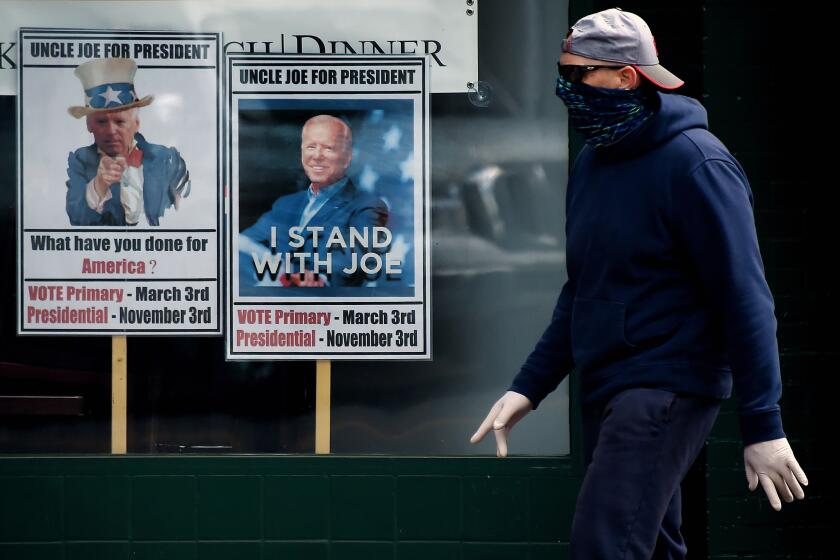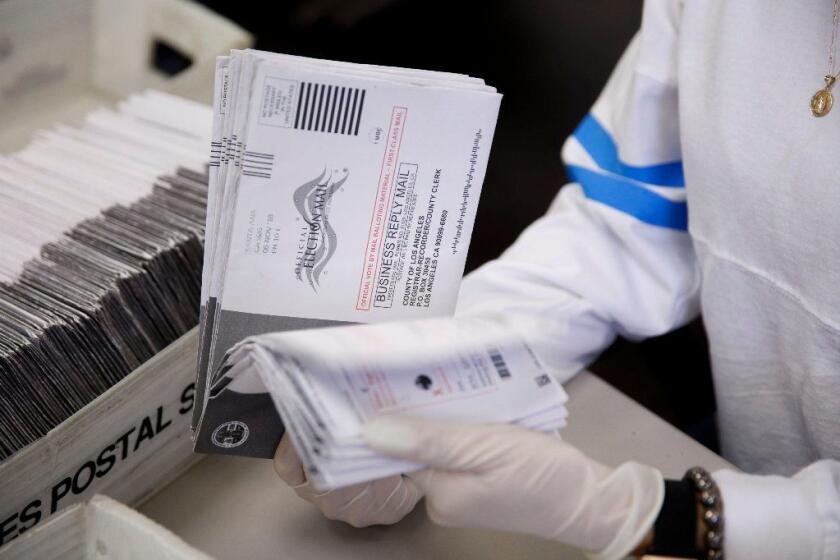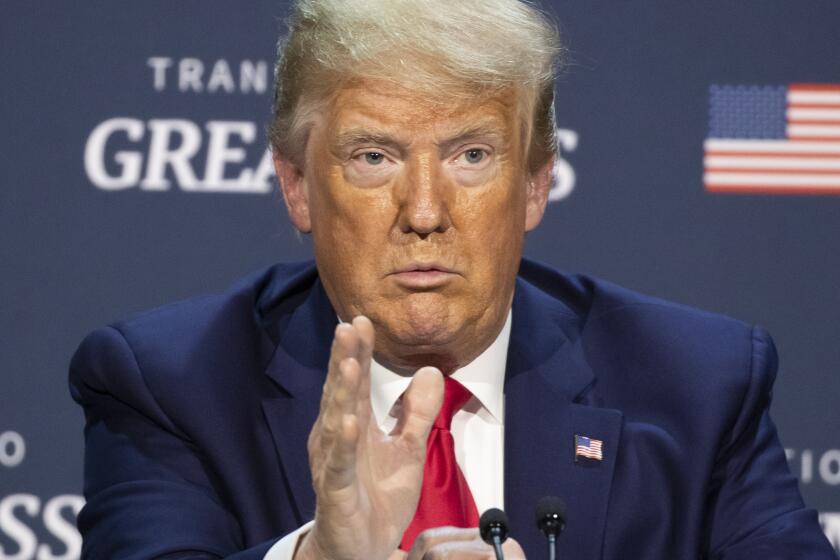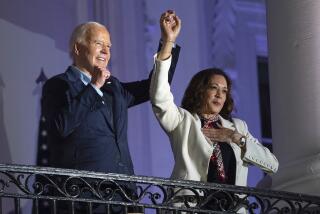News Analysis: Joe Biden is no Hillary Clinton, and that’s a problem for President Trump
WASHINGTON — Joe Biden is old. He has a paper trail reaching back half a century. He is, by his own admission, a “gaffe machine” who regularly trips over his own tongue.
He is not, however, as widely and viscerally disliked as the last Democratic nominee, Hillary Clinton, and that’s complicating President Trump’s reelection effort.
The incumbent is deeply unpopular and, if history is a guide, stands little chance of drastically changing those sentiments by election day.
His best — and possibly only — chance of winning a second term is making Biden seem the more unpalatable of the two; turning the election, in the political shorthand, into a choice between candidates rather than a referendum on Trump’s personality and performance.
Joe Biden’s pledges to ‘change the system’ echo Bernie Sanders and Elizabeth Warren and reflect a new American reality.
The strategy worked four years ago against Clinton. After a quarter-century on the national stage, and a bruising Democratic primary, the former first lady and secretary of State was viewed by many Republicans as a figure of almost singular villainy and by a significant number of independents — who didn’t like either candidate — as the greater of two evils.
This time seems different.
“People are not afraid of Biden,” said Ed Rogers, a former top official in the George H.W. Bush White House and a longtime Republican operative. “He’s not a good enough bad guy” to make the focal point of a negative campaign.
Opinion surveys seem to bear that out.
Polls aggregated by RealClearPolitics found that 45% of those surveyed had a favorable view of Biden and 46% had an unfavorable view. By contrast, Clinton was already a far more polarizing figure at this stage of the 2016 campaign, viewed favorably by 40% and unfavorably by 55%.
(For his part, the president is seen favorably in the latest surveys by 41% of those polled and unfavorably by 55%.)
There are, of course, plenty of people — including some Democrats — who don’t much care for Biden. Some on the left consider him too centrist and too willing to compromise with Republicans. Some on the right consider him a doddering Obama administration relic and glad-handing phony.
But even Trump strategists privately concede the affable Biden is nowhere near as unpopular or easy to demonize as Clinton.
One reason is voters like Republican Chuck Zeman.
The 77-year-old retired financial planner from Sun City, a senior living community outside Phoenix, backs Trump’s bid for a second term, citing the president’s tough stance on immigration and the way the economy hummed before COVID-19 forced businesses into a medically induced coma.
Despite his partisan bent, however, Zeman doesn’t feel hostile toward Biden, who happens to be his same age. “I like the guy personally,” Zeman said. “I think he’s a nice guy.”
COVID-19 has led to a push for vote by mail, but advocates face logistical and legal hurdles — and “rigged election” claims from President Trump.
Supporters of the president, who just turned 74, insist that goodwill only goes so far.
Even after his many decades in politics, they said, Biden remains a mystery to a number of voters. In fact, a recent NBC-Wall Street Journal poll that had Trump trailing by 7 percentage points nationally found nearly a quarter of those surveyed expressed a neutral opinion of the former vice president, suggesting they were open to persuasion over the next few months.
Kelly Sadler, the spokeswoman for a pro-Trump political action committee, said Biden’s political longevity makes him a uniquely vulnerable target.
“Joe Biden has been in public service for 47 years,” said Sadler, communications director for America First Action, which has advertised heavily on Trump’s behalf. “Now he’s campaigning promising to fix the problems he helped create when he was in office.”
For now, the president and his allies have focused their TV advertising on issues such as trade, saying Biden supported deals that punished the industrial Midwest — a key political battleground — and has been too cozy with China, which Trump blames for the COVID-19 pandemic.
The spots have, so far at least, shied away from the kind of scathing character attacks Trump directed against Clinton that, according to some inside the campaign, have been tested and proven less effective against Biden.
Part of the reason may be that Clinton had already been a Republican target for decades — starting with her husband’s 1992 presidential campaign and continuing through her years as first lady, a U.S. senator from New York and Obama’s secretary of State — by the time she became the Democratic nominee.
“People didn’t like Hillary Clinton and that was a byproduct of an intentional political strategy,” said Amanda Litman, director of Clinton’s 2016 email program and co-founder of Run for Something, an organization that encourages young progressives to seek elected office.
“The best negative attacks are the ones that lean into what people already believe, or what they’re inclined to believe if you just give them the language for it, or a proof point,” Litman said. “It’s harder against someone people generally have a positive sentiment about.”
Only a handful of GOP elected officials have publicly criticized Trump. Others fear bringing down the wrath of the president or his supporters.
There is no doubt misogyny fueled some of the anti-Clinton rancor as well, a problem Biden obviously doesn’t face.
Biden may also benefit from two events — a deadly pandemic, an intense national discussion of race and inequality — that seem particularly well suited to his reputation for caring and finely tuned empathy.
J. Ann Selzer, an independent pollster in Des Moines, conducted a recent survey of Iowa showing Biden and Trump effectively tied in a state the president carried four years ago by 9 percentage points. Trump’s approval rating had slipped to negative territory after hitting 51% in early March, a decline she ascribed to the president’s handling of the twin crises.
It’s also noteworthy, Selzer said, that Biden spent much of the last few months campaigning remotely from his basement, limiting his public exposure and minimizing the opportunity to commit another of his infamous gaffes and perhaps chip away at that veneer of likability.
“Apparently he’s saying enough and not too much,” Selzer said. “Whether that can survive to the election we’ll see.”
Times staff writer David Lauter contributed to this article.
More to Read
Get the L.A. Times Politics newsletter
Deeply reported insights into legislation, politics and policy from Sacramento, Washington and beyond. In your inbox three times per week.
You may occasionally receive promotional content from the Los Angeles Times.














